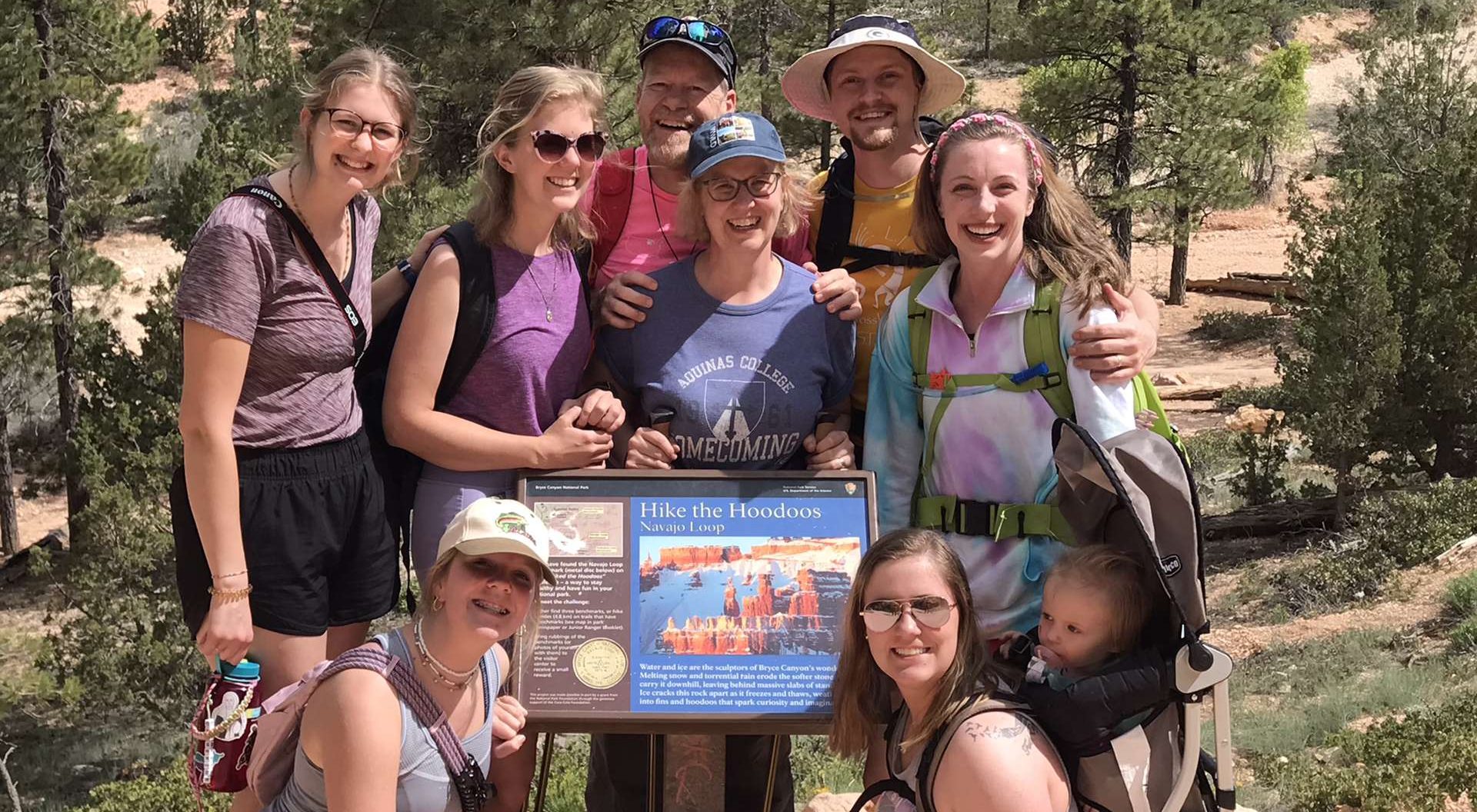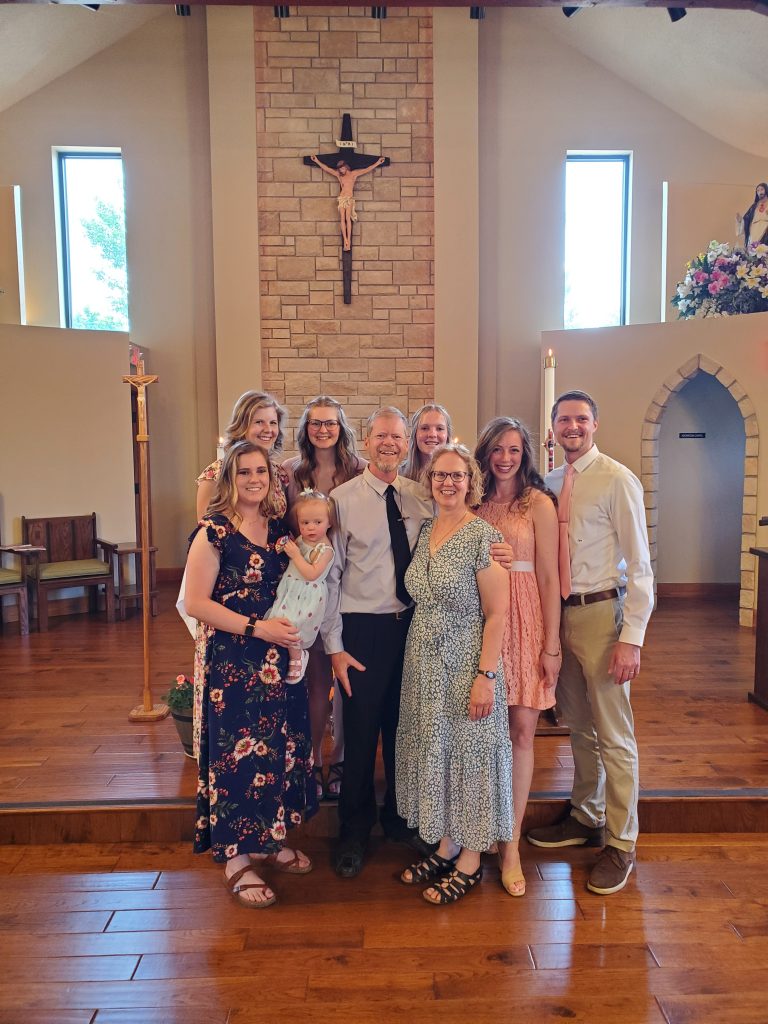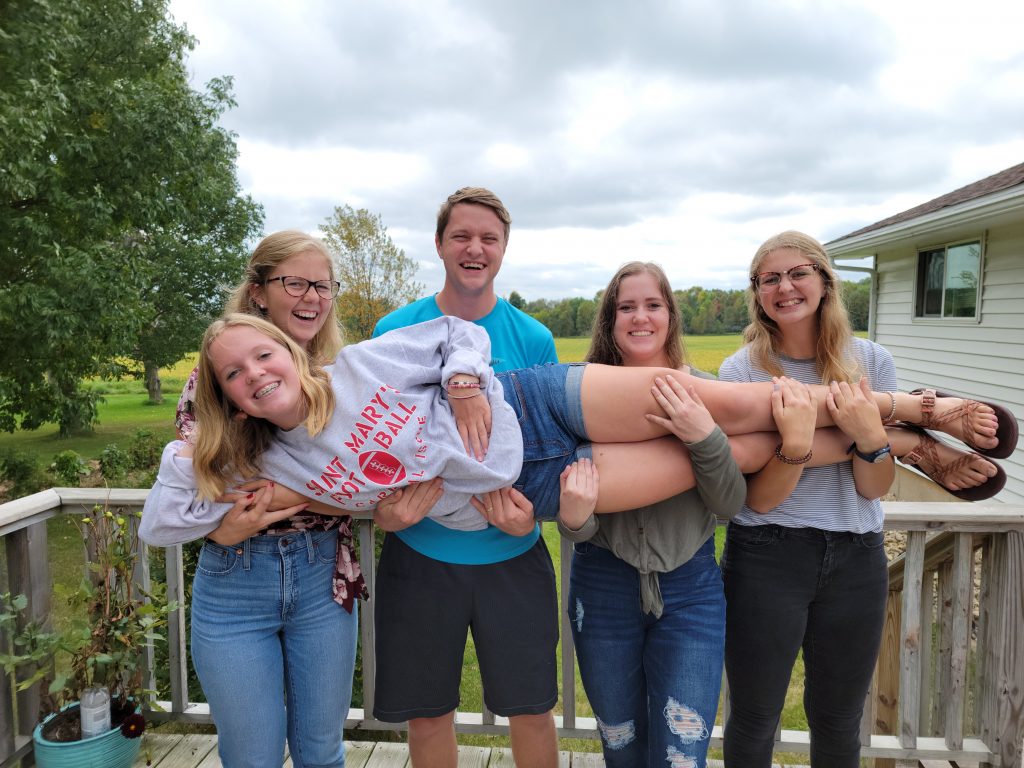When my husband Dan and I were first married, I was convinced that waiting for a year or two before having children was the best way to start our marriage. All of my friends advised us that couples needed that time to bond and establish their relationship, and having children too soon could negatively affect that bonding. I bought into that idea. I also knew the perfect number of children for me was three: a boy, a girl and a baby.
However, we had committed to practicing Natural Family Planning (NFP) and being open—at least in principle—to God’s plan for our family. We did not have any reason to avoid pregnancy, and shortly after our marriage, we found out that we were expecting. At first, I struggled with the news. This was not what I had planned, and I was concerned about what my friends would think. I certainly hadn’t given my relationship 2 to 3 years to meld! I felt like I had failed. However, as often happens, it soon became apparent that God knew best after all. Having our daughter was such a blessing. She was a blessing, but her appearance in my life also started showing me how much I needed to grow.
Natural Family Planning “is the process of observing one or more of the body’s natural signs of fertility and making couple decisions about whether or not to achieve a pregnancy” based on that information. “Fertility Awareness–Based Methods” (FAMB) is becoming popular among all populations. Many couples turn to these methods to help them plan their families because they have become disenchanted with other family planning methods.
I believe that NFP, when practiced as intended by God, is superior to FAMB. NFP allows couples to partner with God. The early Christian author Tertullian describes spousal love this way: “How wonderful the bond between two believers, with a single hope, a single desire, a single observance, a single service! They are both brethren and both fellow servants; there is no separation between them in spirit or flesh. In fact, they are truly two in one flesh where the flesh is one, one is the spirit.” To achieve this one heart, one flesh, one soul a couple must engage in a prayer of discernment, particularly in regard to family life.
That sounds simple enough, but the concept of NFP is actually quite challenging. It contradicts what many people consider to be “natural” or “normal” because natural is often thought to be effortless—like breathing. However, in this context, natural means aligning with our human nature. We, as human beings, are designed to think and choose—to utilize our intellect and will.
After my daughter was born, my husband and I started to explore NFP and how it fits into God’s plan for love and life. Following the birth of our first son, Zechariah, I joined a women’s study group that was reading Pope St. John Paul II’s Familiaris Consortio and Pope Paul VI’s Humanae Vitae. This study helped us understand that NFP is not a means of controlling the size of our family, but rather a way for my husband and me to grow together toward becoming one heart, one flesh and one soul by exercising responsible parenthood. “The responsible exercise of parenthood implies, therefore, that husband and wife recognize fully their own duties towards God, towards, themselves, towards the family towards society, in a correct hierarchy of values.” (Humanae Vitae) We began to see NFP as a prayerful tool for discernment.
Our first son holds a special place in my heart, but he was a difficult baby. By the time he turned 1 year old, my husband and I had concluded that two was the right number of kids for us. We decided that this “raising babies thing” was too difficult, and we were done. However, while continuing in my group study of “Family Life in the Modern World,” the beauty of marriage and the promise to be open to life repeatedly was discussed. This challenged my husband and me to reconsider our decision. We began to pray that God’s will would become clear, and within a few months, our hearts started to change. We soon found out that we were expecting our third child. Once again, I was reminded that our commitment to being open to life was not about what we wanted but what God asked of us.
Our second son was born with a heart defect and died at 12 days old. I can’t explain it, and I don’t understand all of the whys of this situation, but I know I have experienced an abundance of blessings from this child’s birth, life and after-life. The blessings my family has received from having a saint interceding for us in heaven are immeasurable! Losing Jeremiah has also led us to be more open to God’s plan for our family.
At first, I was sure that we were done having kids. I really wasn’t able to think about the possibility of going through that kind of loss again. Besides, I now had what I thought was the perfect family from the beginning: a boy, a girl and a baby. But once again, we were drawn out of ourselves by God’s call to be open to life.
“In the task of transmitting life, therefore, they are not free to proceed completely at will, as if they could determine in a wholly autonomous way the honest path to follow; but they must conform their activity to the creative intention of God, expressed in the very nature of marriage and of its acts, and manifested by the constant teaching of the Church.” (Humanae Vitae)
Was losing Jeremiah enough of a reason to cut ourselves off from more children? Should grief have that power over us? What does God want from us? How much must I give?
After praying through these questions, our grief and contemplation of the idea of being open to life, we were surprised to find out that we were expecting our fourth baby sooner than we had anticipated. Conceiving Rebekah was not a deliberate decision but rather a choice to trust in God’s providence and remain open to love and its effect on my life. NFP is a practice that requires a couple to walk with God, drawing them closer to a fuller relationship with the Father.
Over the next several years, my husband and I continued to grow in our relationship with each other, with God and with the Church as we revisited the idea of being open to life again and again and again. There were times when trying to have another child overwhelmed us and we heard God tell us to rest and remain open to life, but not actively seek conception. And yet, at other times, we felt God asking us to expand our family again, to have another child.
Contraception didn’t happen for months and there was a period when I was frustrated with keeping a chart, so we put it aside. During this time, it took us awhile to get pregnant. No matter what stage of married life we were in, using NFP continued to be our reminder that God was calling us to be open to His plan. And the process of being open and trusting in God drew us out of ourselves and into a closer relationship with God and His Church. NFP is truly at the heart of our marriage and joy in family life!
Story by Christy Kitzhaber
Published in the July/August 2024 issue of Catholic Life Magazine



